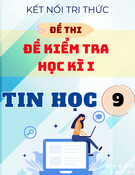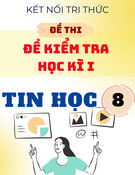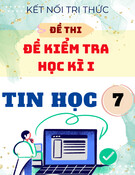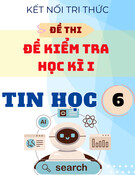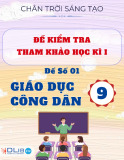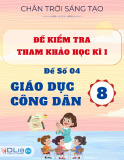
Họ và tên thí sinh: ………………………… Chữ kí giám thị 1: …………… Mã phách:…...
Số báo danh: ……………………………… Chữ kí giám thị 2:……………. ……………....
Ngày sinh:……………………………………. Trường:
…………………………………………..
___________________________________________________________________________
TRƯỜNG THCS PHONG THẠNH TÂY KỲ THI CHỌN HSG LỚP 9 CẤP TRƯỜNG
NĂM HỌC: 2024-2025
ĐỀ CHÍNH THỨC MÔN: TIẾNG ANH
(Gồm 5 trang) Thời gian: 150 phút (không kể thời gian giao đề)
PHẦN DÀNH CHO CHẤM LẦN ĐẦU:
Điểm thống nhất Chữ kí GK1 Chữ kí GK2 Mã phách
Bằng số Bằng chữ
ĐIỂM TỪNG CÂU:
Part 1. LISTENING Part 2. LANGUAGE
FOCUS
Part 3. READING Part 4. WRITING
I. I. I.
II. II. II.
III. III
TOTAL
PHẦN DÀNH CHO CHẤM PHÚC KHẢO:
Điểm thống nhất Chữ kí GK1 Chữ kí GK2 Mã phách
Bằng số Bằng chữ
ĐIỂM TỪNG CÂU:
Part 1. LISTENING Part 2. LANGUAGE
FOCUS
Part 3. READING Part 4. WRITING
I. I. I.
II. II. II.
III. III.
TOTAL

Họ và tên thí sinh: ….................................……………… Chữ kí giám thị 1: ……………
Mã Số báo danh: …………………………...............…… Chữ kí giám thị 2:…………….
_____________________________________________________________________________
KỲ THI CHỌN HSG LỚP 9 CẤP TRƯỜNG, NĂM HỌC: 2024-2025
Đề thi môn: Tiếng anh 9
Thời gian: 150 phút (không kể thời gian phát đề)
(Học sinh làm bài trên đề thi)
PART 1: LISTENING (3 pts)
I. Listen to the passage and then choose the option (A, B, C or D) to
complete each sentence. You will hear the recording twice. (1.5pts)
1. What is the most serious problem in Bangkok?
A. Bad weather B. Pollution C. Crime D. Traffic jams
2. How does Suzanne go to work?
A. By car B. By bus C. By Sky train D. By metro
3. How long does it take Suzanne to go to work every day?
A. two hours B. five hours C. half an hour D. seven hours
4. Is the traffic in the evening ? – Yes, it is
A. the better B. the worst C. worse D. the same
5. Why is traffic so bad in Bangkok?
A. people move around by boat B. There are not enough roads
C. There are enough roads D. There isn’t a Sky train or metro
Your answers:
1. ……… 2. ………… 3………………. 4………………. 5……………...
II.Listen to the phone conversation between Marek and Sarah. Then write
the missing word in each gap. (1,5pts)
1. Marek’s sister teaches_________________
2. Sarah’s parents work for a small
film.
3. Marek is planning to arrive in England in the month of____________
4. Marek hopes to find a ____________ or a flat on the internet.
5. Sarah’s family live at ___________ Forest Gardens.
Your answers:
1. ……… 2. ………… 3………………. 4………………. 5……………...
PART 2: LANGUAGE FOCUS (7 pts)
I. Choose the best option A, B, C, or D to complete each sentence. (2.0 pts)
1. You should have an / a check your motorbike regularly.
A. electrician B. carpenter C. mechanic D. plumber
2. Don’t forget home as soon as you arrive at your destination.
A. to call B. calling C. having called D. to be called
3. She must go to the dentist and .
A. get her teeth to take care of B. take care of her teeth
C. her teeth be taken care of D. get her teeth taken care of

THÍ SINH KHÔNG VIẾT VÀO ĐÂY
_____________________________________________________________________________
4. Nobody was injured in the accident, ?
A. were they B. weren’t they C. didn’t they D. wasn’t it
5. This singer wore dark glasses to avoid .
A. recognizing B. being recognized
C. have recognized D. having recognized
6. Don’t talk in class, ? The teacher is explaining the points.
A. do you B. don’t you C. will you D. won’t you
7. They are discussing the celebration that is going to this month.
A. hold B. held C. be hold D. be held
8.It’s high time we our house. It looks so old.
A.repaint B. repainted C. repainting D. to repaint
9.I remember him somewhere but I can’t tell where it was.
A. to see B. seeing C. to be seeing D. to be seen
10. He will finish his work before you here tomorrow.
A. leave B. left C. will leave D. Leaving
Your answer
1. ………… 2. ………… 3………… 4………… 5…………..
6. ………… 7. ………… 8………… 9………… 10…………
II. Read and choose the best option A, B, C or D to complete the passage.
(2pts)
Our classes take place for three hours every morning from Monday to
Friday. The maximum class size is twelve and the average is ten. We use modern
methods of teaching and learning. You will only be successful in improving your
English, however, if you work hard and practice __________ (1) English as much
as you can. You will take a short _________ (2) in English as soon as you arrive.
In this way, you can put you in a __________ (3) at the most suitable level.
There are two classes at Elementary level; one is complete_________ (4)
and the other is for students who know only a little English. In both classes, you
will practice simple conversations. In the class at the Intermediate level you will
have a lot of _________ (5) in communicating in real-life situations because we
help you to use the English you have previously _________ (6) in your own
country. You will also have the chance to improve your _________ (7) of English
grammar and to build up your vocabulary. The emphasis in an oral communication
practice is a wide variety of situations at the advanced _________ (8). You will
learn how to use language correctly and appropriately when you _________ (9) to
native speakers. In addition, you will develop such study skills as reading
efficiently, writing articles and reports, and note-taking from books and _________
(10).

Họ và tên thí sinh: ………………………… Chữ kí giám thị 1: …………… Mã phách:…...
Số báo danh: ……………………………… Chữ kí giám thị 2:……………. ……………....
_____________________________________________________________________________
1. A. to speak B. speak C. speaking D. speaks
2. A. test B. examination C. examining D. examiner
3. A. class B. room C. school D. place
4. A. students B. people C. partners D. beginners
5. A. practice B. practiced C. practicing D. practices
6. A. learn B. study C. acquired D. learnt
7. A. matter B. mind C. subject D. knowledge
8. A. step B. level C. knowledge D. qualification
9. A. say B. talk C. tell D. discuss
10. A. lecture B. lecturing C. lectures D. lectured
Your answers
1. ………… 2. ………… 3………… 4………… 5…………..
6. ………… 7. ………… 8………… 9………… 10…………
III. Complete the second sentence in such a way that it is almost the same
meaning as the given one. (3pts)
1. I spent three hours making this birthday cake.
It ……………………………….………………………………………..……
2. The teacher said to Long: "How much time do you spend on your English,
Long?"
The teacher ………………………………………………………………………
3. People say football is the best game to play.
Football …………………………………………………………………………
4. Jack is too short to play basketball.
Jack isn’t ………………………………………………………………………….
5. They started checking the machines two days ago.
They have ………………………………………………………………………
6. It’s ages since I last talked to him.
I have
……………………………………………………………………………...
7. Mr. Minh had the students clean the schoolyard.
Mr. Minh ………………………………………………………………………….
8. That restaurant is so dirty that no one wants to eat there.
It is such …………………………………………………………………………..
9. They spent more money, they had to work harder.
The more …………………………………………………………………………
10. He didn’t attend the meeting since he was ill.
Because of ………………………………………………………………………

THÍ SINH KHÔNG VIẾT VÀO ĐÂY
____________________________________________________________________________
PART 3: READNG (5pts)
I. Read the passage and fill in each gap with ONE suitable word. (2pts)
There are at least 2,000 different (1) ________ in the world. Of all these
languages, English is (2) ________ most widely used. It is used (3) _____business
people, airline pilots and sea captains all over the world. (4) ________ is also the
first language of sport and science. So it is very important to learn English.
Chinese is also an important language because it has the greatest (5) _____of
speakers. There are (6) ________over one billion people living in China today, but
also many Chinese people living outside China. Chinese is widely (7) ________in
many parts of Asia and Africa. Russian is spoken in (8) _______Europe and Asia.
French is widely understood in Europe and in parts of Canada, Africa and Asia.
From more (9) ________2,000 languages, The United Nation has chosen six
of them (10) ________business. They are Arabic, Chinese, English, French,
Russian and Spanish.
II. Read and choose the best answer for each question: (2pts)
With the invention of the microcomputer, a computer can now be purchased
for as little as a few hundred dollars. Taking advantage of this situation, quite a
few secondary schools, even kindergartens, have already begun to use computers.
Many other schools, however, are hesitating to introduce computer science onto
the school curriculum. They wonder if students, especially younger ones, will able
to use these complicated machines. They also fear that they may only be suitable
for youngsters who are good at math. “What about slower students?” they ask.
Will computers make learning even more difficult for them? Then again, will
learning with a computer be boring?
Schools that are actually using computers are discovering answer to these
questions. Surprisingly, students who are only 6 to 7 years of age are taking to the
machines like fish to water. They are not only finding them easy to use, but they
are also finding them fascinating.
1. Nowadays, we can get a computer________.
A. at a very high price B. at a terrible price
C. at an affordable price D. at a very low price
2. According to the passage, _________ .
A. all schools have already begun to use computers
B. one school is hesitating about using computers
C. schools have different ideas about using computers
D. schools have the same idea about using computers
3. To many teachers, who are better at using computers?
A. children from 4 to 6 years of age B. slow students
C. mature students D. students who are good at math
4. Students who are 6 to 7 years of age__________ .
A. hate using computers B. enjoy using computers

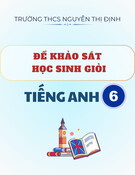

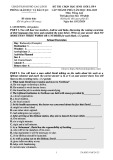
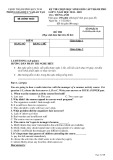
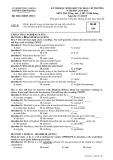
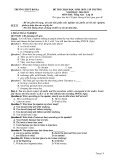
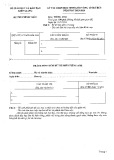
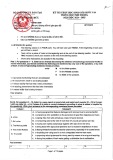

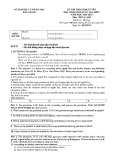




![Đề tham khảo ôn tập học kì 1 môn Toán lớp 6 năm 2025-2026 - Trường Trung học Thực hành Sài Gòn [Mới nhất]](https://cdn.tailieu.vn/images/document/thumbnail/2025/20251206/tnkhanh@sgu.edu.vn/135x160/64331765161604.jpg)
